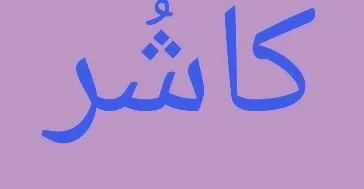A British speaks English because he is British, an Arab speaks Arabic, a Tamil speakes Tamil, an Irish speaks Irish; because language is the first link to one’s identity.
But gosh! We (Kashmiris) are hanging in the middle where we neither know English nor Urdu, and when needed we fail to speak any. We have distanced ourselves from our Maej Zaev – mother tongue.
Every citizen represents his mother land by speaking his mother-tongue. Whatever the case, they never jump to speak in any other language other than their own.
Because they know that their language is their identity and with it they feel complete. But how ironical! We feel a bit inferior in speaking our own language.
Our mother-tongue is in danger of extinction in our own land. Despite being its inheritors, we appear total strangers to it. A teacher prefers to speak in Urdu or English because he knows that if he did the reverse he will be considered inferior.
The new generation seems least interested in their roots because they were brought up so. Until yesterday, we had illiterate parents but now they are educated and the most modern; and these modern parents even in presence of their children seem to be out of place.
See the step-motherly approach of people around. They prefer to exchange their ideas in Urdu or English than Kashmiri, because they think if they didn’t do so they will be disdained by others. Although Kashmiri was introduced as a subject in the school curriculum yet it is undermined.
One wonders when on steps in the campus of Kashmir University, it seems one is walking through a place outside Kashmir.
Both, students and scholars, feel ashamed of speaking Kashur when they express their ideas. They prefer to talk in English or Urdu than Kashmiri.
How can we expect students to promote and speak in their mother-tongue when situation at the highest seat of learning is like this? Do we really don’t need this language?
Who will speak this language if not its inheritors? Urdu had taken over our madreae zabaan. Authorities, especially in private institutions, compel their students not to speak in their mother-tongue.
Parents visit institutions weekly to seek progress report of their kids about communication habits in other languages but not in their own. Let’s not forget that our sweet mother-tongue is fast vanishing and with it weakens our identity, culture, and heritage etc.
We know so many poets and writers in Urdu and English. It’s good if we equally know poets and scholars of our own language. Reading John Keats and leaving Rasool Mir isn’t good. It simply shows our indifference towards the language that we have inherited from our parents.
Reading Shakespeare, John Keats, Wordsworth, Milton, and Donne, and leaving Shaikhul Aalum, Rasool Mir, Wahab Khar, Lal Ded, Habba Khatoon, Mehjoor, Ahad Zargar, and Soch Kral is simply ignorance.
Our research scholars have so much content in their mother-tongue to do their research. But how pity, they are lost in other languages. Alumdar-i-Kashmir (RA) and host of others would not have been widely understood, had they not written in their own Maej Zaev.
Prof Rehman Rahi (Giyan Peeth Awardee) wouldn’t have been so renowned had he not committed himself to Kashmiri. Rabindranath Tagore, Nobel Prize Winner in Literature, would have never penned down Gitanjale, had he not written his poems in his own mother-tongue.
One gets very disappointed when one finds that English and Urdu have replaced our Maej Zaev. When we look around, we find it very least spoken.
English language, which has entered our kitchen now, has almost replaced our Maje Zaev. If we won’t wake up then the day is not far when we will find ourselves struggling for our identity.
Let’s love this language and try to pass on this rich legacy to our future generations. Come, let’s put in efforts to get it back. Remember, if we want to demolish a nation, demolish its language.
Manzoor Akash works as a teacher in the Dept. of School Education J&K
Disclaimer: The views and opinions expressed in this article are the personal opinions of the author.
The facts, analysis, assumptions and perspective appearing in the article do not reflect the views of GK.







